US hits record for transgender killings. Puerto Rico is the epicenter of the violence
She was an amazing dancer.
That’s what Kimberly Vasquez Arciliares remembers most about Penélope Díaz Ramírez, with whom she often shared the drag stage in San Juan. After shows, the two would hit the clubs and chatter about life, comparing the clinics they’d visit for hormone treatments as transgender women in Puerto Rico.
“She was an excellent drag queen, and an amazing lip-syncer and choreographer, too,” Vasquez said. “She was in the process of transitioning, and trying to live her true life as a female.”
On April 13, 2020, Diaz was found beaten and hanged at a men’s correctional facility to which she’d been wrongfully assigned in Bayamon, becoming the ninth of what would be 44 transgender killings in the USA and its territories last year. It was the country’s deadliest year on record.
Nowhere has the crisis been more pronounced than in Puerto Rico, where 12 transgender victims, most of them women, were killed in a two-year span. The violence comes amid a shifting national debate on transgender rights and moves by the territory to deal with its long history of brutality against women.
Puerto Rico’s transgender community and its allies blame the killings on a mix of religious fundamentalism, transphobia, indifference from authorities and lingering economic effects of the COVID-19 pandemic and Hurricane Maria.
“The transgender community is the most discriminated within the LGBT community, and Puerto Rico is no exception,” said Carmen Yulín Cruz Soto, San Juan’s mayor from 2013 until last year. “There’s still a lot of conservative, religiously motivated thought. Legislators are too concerned about people’s sex lives, when they should be concerned about protecting people’s rights to live their lives the way they want.”
Activists said action is urgently needed. Transgender killings in the USA are on rapid pace to exceed last year’s record violence. There have been 20 cases – most recently the death of Keri Washington, 49, who was found dead May 1 in Clearwater, Florida.
President Joe Biden has taken steps to ensure federal protections for transgender rights and reassure the LGBTQ community that he is on their side. In his address April 28 to Congress, he called on lawmakers to pass the Equality Act, which seeks to ban discrimination based on sex, sexual orientation and gender identity. GOP lawmakers in dozens of states are pushing bans on transgender rights.
Puerto Rico accounted for six of last year's 44 transgender killings. The victims ranged in age from 19 to 33. Most were shot multiple times. Two were burned in a car. One was stalked and killed on her birthday, the incident coldly documented on social media.
Only one case produced arrests, and it was handled not by Puerto Rican police but by the U.S. Department of Justice, which is prosecuting it under federal hate crime charges.
Police, activists said, don’t treat such crimes seriously, consistently misgendering victims of violence, failing to collect data about anti-LGBTQ offenses and rarely applying hate crime laws.
Diaz’s case is one of many tragic examples, they said.
“They didn’t follow protocols, and they sent her to a men’s prison,” said Pedro Julio Serrano, executive director of Puerto Rico Para Tod@s, an LGBTQ advocacy group in San Juan. “That murder could have been prevented.”
Waiting until dark to go out to avoid violence
In 2017, a study of transgender women led by University of Puerto Rico researchers found that high levels of violence against women were compounded by the island’s weak infrastructure and poor methods of tracking such crimes.
“Intolerance toward transgender people in Puerto Rico is rooted in a strong Judeo-Christian religious heritage,” the researchers wrote.
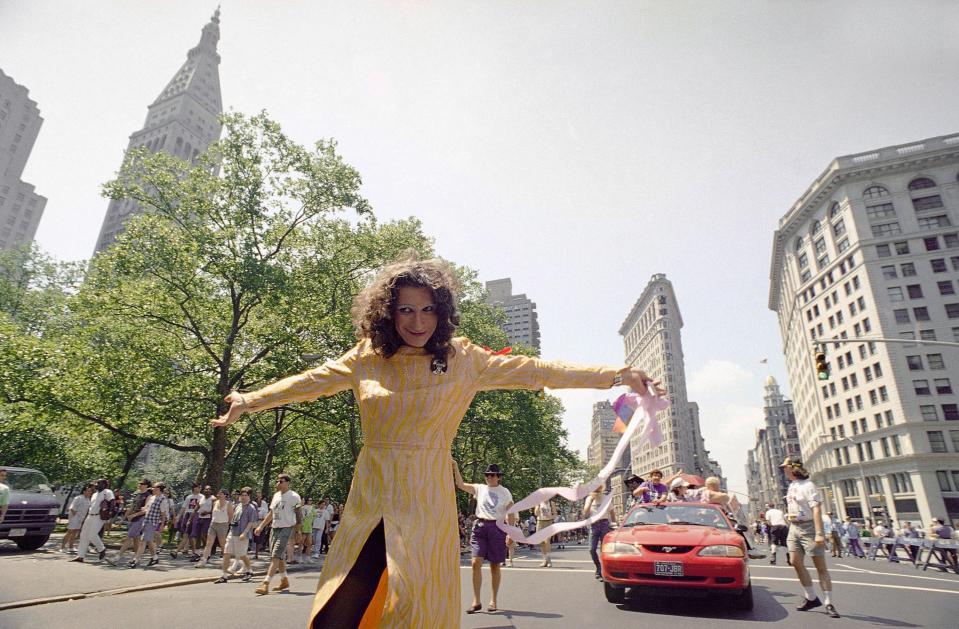
Sheilla Rodriguez-Madera, among the University of Puerto Rico study’s lead authors and a public health professor at Florida International University, said that independent of its political relationship with the United States, Puerto Rico is essentially part of Latin America, a heavily Catholic region that has traditionally opposed LGBTQ rights.
In that sense, she said, the killings there should be considered “not as isolated events but as part of a pattern of systematic elimination of trans individuals in the Latin American region.”
Last year, 82% of the world’s 350 transgender killings took place in Central and South America, according to Transrespect vs. Transphobia Worldwide, which compiles such annual data. More than half of all cases happened in Brazil.
Penélope Díaz Ramírez loved makeup, fashion, and performing. #RIP #StopTransViolence pic.twitter.com/ZRqLQOo5kK
— National Center for Transgender Equality (@TransEquality) August 14, 2020
In San Juan, Vasquez, 42, knows she has been luckier than many: Born and raised in Ponce, on Puerto Rico’s south coast, she enjoyed her parents’ support for her passion for dance and her early sense of female identity. She began her transition, earned a degree in fashion design and works as a case manager for Arianna’s Center, a transgender support agency in San Juan.
Living as a transgender woman has meant negotiating constant hurdles and hurtful experiences. The spate of fatal violence has put Vasquez and others in Puerto Rico's community on edge. Never have the feelings of hate felt so pronounced, she said.
She and others live cautiously, waiting until after dark to go out. It’s easier to blend in, to live as themselves without feeling conspicuous. Vasquez remains vigilant in public and calculating about where she goes, careful about how she expresses herself, speaking in low volumes, accentuating a female tone.
“I almost feel like I have to wear a costume,” she said. “To be, in a sense, unseen. So I don’t get hurt.”
Women of color most often victims of transgender violence
In the USA and Puerto Rico, Black and brown transgender women are most often killed.
Since 2013, of the 200-plus instances of fatal violence against transgender or gender nonconforming people tallied by LGBTQ advocacy group Human Rights Campaign in the USA and its territories, nine in 10 victims were transgender women. Black transgender women accounted for two in three deaths overall.
“It is clear that fatal violence disproportionately affects transgender women of color,” HRC noted in a report in January. “The intersections of racism, transphobia, sexism, biphobia and homophobia conspire to deprive them of necessities to live and thrive.”
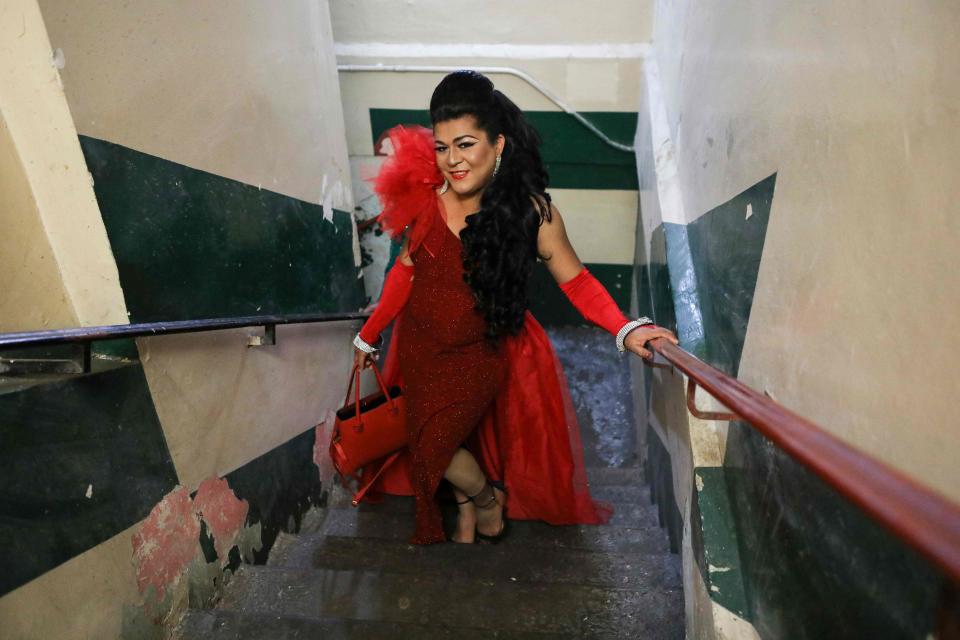
Alphonso David, president of the Human Rights Campaign, blames the rising violence on the anti-LGBT policies and rhetoric of the Trump administration.
“The reasons we are seeing increased attacks on transgender and gender-nonconforming people is because they have been demonized and demoralized by the White House of the last four years,” David said. “When you stigmatize and dehumanize people, it’s much easier for others to do the same.”
By pushing regulations that deny the humanity of transgender people by blocking access in health care, housing and employment, David said, “it provides license to others who take action based on their biases. Lawmakers are directly responsible. They’re pretending transgender people don’t exist.”
The same forces are at work in Puerto Rico, said Victoria M. Rodríguez-Roldán, a trans woman and native of the island. Political rhetoric has emboldened others to act out, she said, while those in power look the other way.
“Trans people don’t see that the government is on their side,” said Rodriguez-Roldan, senior policy manager for AIDS United, a Washington-based agency dedicated to ending the HIV epidemic.
Puerto Rico slow to embrace LGBT rights
Scant information about the island’s LGBT population exists, but executive director Wilfred Labiosa of Puerto Rico’s Waves Ahead, which serves older LGBT adults, said academic and organizational studies suggest that LGBT people comprise up to 9% of the population in larger cities such as San Juan, Ponce and Mayaguez. The agency is working to compile specific data about the island’s trans population, he said.
Cruz, the former San Juan mayor, said the city's efforts to support the transgender community – including the launch of Puerto Rico’s first trans-focused health clinic and a community event called the Trans Goofy Games – did not sit well with some.
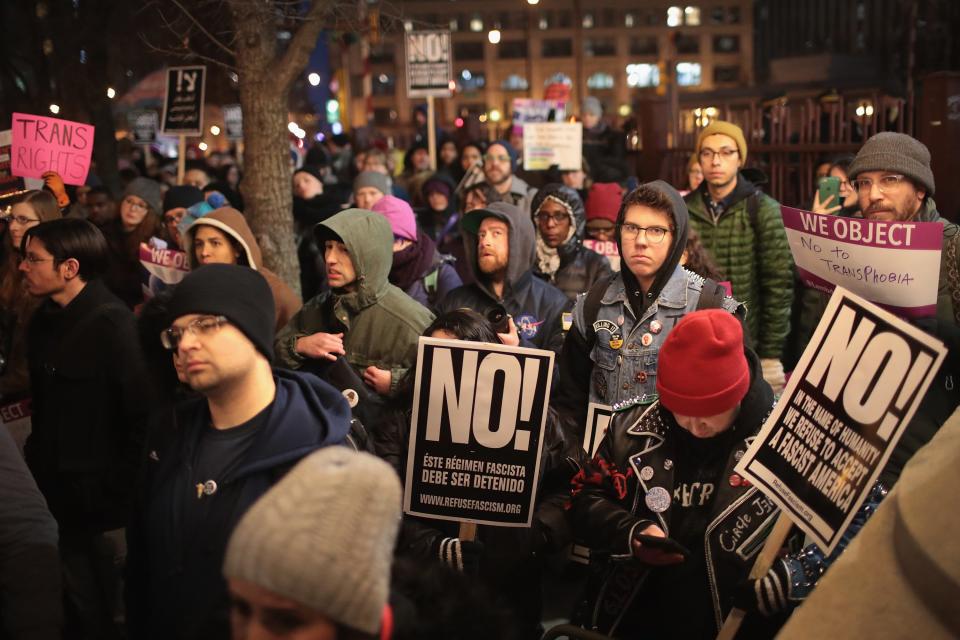
“We faced veiled resistance,” said Cruz, a fellow for leadership initiatives at Mount Holyoke College in South Hadley, Massachusetts. “People would call and tell me, ‘Don’t do it. We’ll lose the conservative vote.’ Some saw my solidarity with the LGBT community and would say, ‘Oh, it must be because she’s a lesbian.’ Because God forbid someone actually feel some empathy.”
Public opinion surveys about LGBT issues on the island are also scarce, though Latin Americans tend to be more conservative regarding social and sexual mores. In 2014, a Pew Research Center study focused on religion found that aside from a handful of countries such as Uruguay and Argentina, a majority of people in Latin America strongly opposed gay marriage, including 55% of Puerto Ricans.
“We’re about 10 years behind the U.S. in terms of attitudes and public consciousness,” said trans activist Joanna Cifredo, executive director of San Juan's LGBTQ-focused True Self Foundation. Puerto Ricans haven’t had the degree of exposure to homegrown transgender celebrities that mainland Americans have had with people such as Laverne Cox and Caitlyn Jenner, she said.
“In the U.S., it’s a lot more mainstream,” Cifredo said. “There’s a culture of LGBT student clubs there, and here in Puerto Rico, that’s almost nonexistent. There’s a lack of safe places for queer people.”
Like Vasquez, Cifredo and her transgender friends take precautions when they go out, traveling in clusters of two or three.
“Rarely do you see trans women by themselves,” Cifredo said. “We carpool. We avoid public transportation as much as possible. Whenever I drop off my friends and drive home, I don’t stop for gas or anything. I try to keep to myself and not draw attention.”

Some transgender rights advances have been made over the past decade. In 2013, Puerto Rico banned job discrimination based on gender identity or sexual orientation, then gained same-sex marriage rights with a U.S. Supreme Court decision in 2015.
The past five years have seen laws passed allowing transgender individuals to change their driver’s licenses and birth certificates to update their names and gender markers.
As part of their attempts to stymie a bill that would ban conversion therapy, some lawmakers tried to submit amendments to the measure that would prohibit transgender youth from receiving gender-affirming care. Cifredo said she doesn't believe those amendments will survive the bill's final version.
Such efforts, she said, are “bullying on behalf of the state. They basically sanction the violence that we experience. And it has serious consequences. All the trans people murdered here in Puerto Rico over the last year – not one of them had reached my age. And I’m 34.”
'They hunted her down': A killing that shook the community
Puerto Rico’s most recent transgender killing victims included Samuel Edmund Damián Valentín, a young trans man found shot multiple times along an expressway in metropolitan San Juan in January.
Six more took place in 2020. Along with Diaz, there was Michelle “Michellyn” Ramos Vargas, a transgender woman in her mid-30s, who was found shot Sept. 30 in the southwestern city of San German. In the small northwestern city of Moca, Yampi Méndez Arocho, 19, a trans man who loved the NBA's Miami Heat, was killed March 5, 2020.
Serena Angelique Velázquez Ramos, 32, and Layla Pelaez Sánchez, 21, were killed April 21, 2020, in Humacao, allegedly by two men who said they had partied and had sex with the women before discovering their transgender identities. According to an affidavit, the women were shot in their car, which was then set ablaze.
It was the slaying on Feb. 24, 2020, of a homeless transgender woman who called herself Alexa that most shook the community for its audacity, cruelty and, within the tightknit trans community, a sense that it could have happened to anyone.
Wow. Bad Bunny (@sanbenito) wore a skirt on the @FallonTonight with a sweater that read "they killed Alexa, not a man with a skirt"
Alexa was transgender woman in Puerto Rico ridiculed & killed, on her birthday, by murderers who videotaped the crime & posted it on social media. pic.twitter.com/i2iBAmdVK5— David Begnaud (@DavidBegnaud) February 28, 2020
The 27-year-old was often pictured in others' social media posts walking the streets with her purse and brandishing a handheld mirror that advocates said she used to monitor potential threats behind her.
In February, someone called police to claim Alexa was using the mirror to spy on people in the women’s restroom at a McDonald’s in Toa Baja, west of San Juan. Officers responded and chose not to arrest her – but the exchange, captured on video, went viral online as she was painted as a community threat, then stalked.
Video footage captured in the early morning hours and posted online relayed the voices of young men mocking her in the darkness, followed by the sounds of gunfire. Alexa was found shot multiple times. It was her birthday.
More than a year later, police have yet to charge anyone with the murder.
“It was recorded,” Cruz said. “They hunted her down. And that speaks to somebody thinking they can get away with anything, when they feel there’s no accountability.”
Serrano, of Puerto Rico Para Tod@s, said the tepid law enforcement response is reflective of the culture of the Puerto Rico Police Department, which was accused by the U.S. Department of Justice a decade ago of constitutional violations, including use of excessive force during routine police activities, unreasonable force in response to public demonstrations and unlawful searches and seizures.
“They really don’t care about these cases,” Serrano said.
The Puerto Rico Police Department did not follow through on requests to provide information about the killings or about how police are trained to deal with the transgender population.
Issues cited by transgender activists in Puerto Rico echo complaints leveled at U.S. police departments, including misidentification of victims by past names or incorrect gender.
“A lot of these victims are misgendered when the incidents are written down on police reports,” said Jesse Garcia, who chairs the League of United Latin American Citizens’ LGBTQ affairs committee. “Relatives who claim the bodies sometimes use the wrong gender because of shame or because they don’t want the attention."
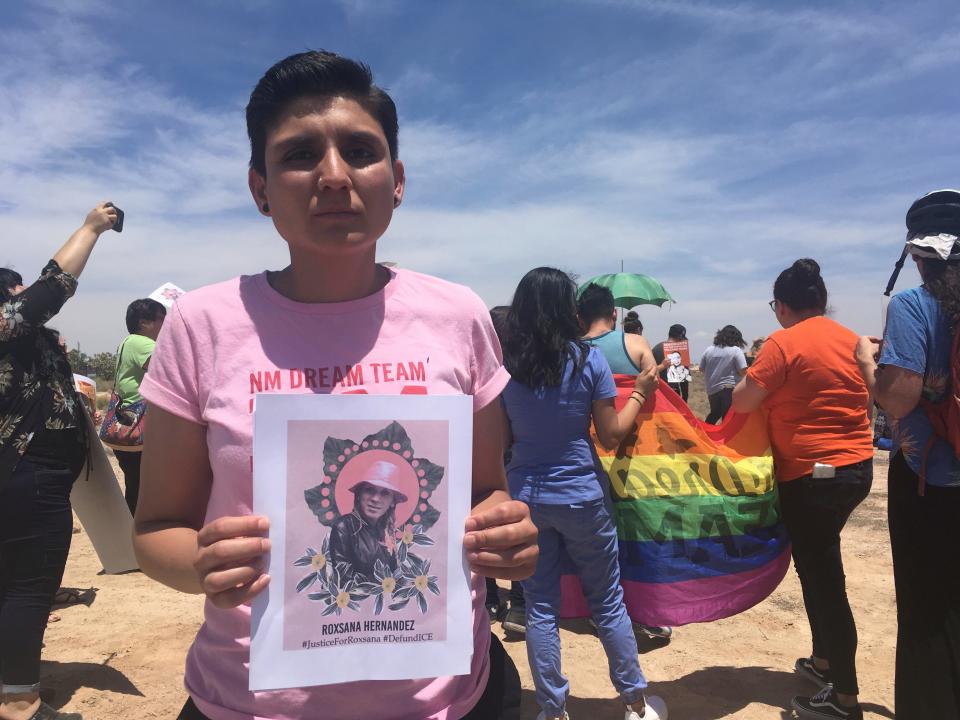
Some said such errors can’t be completely chalked up to unawareness or procedural limitations that probably contribute to the undercount of transgender killings.
“Those are calculated ways to express that you do not value an individual’s gender identity,” said University of West Virginia sociology Ph.D. candidate Rayna Momen, a nonbinary transgender person who has studied violence against the U.S. transgender community with colleague Lisa Dilks.
“When you truly do not value an entire population, even when it comes to the most brutal violence, the priority to prosecute crimes to the fullest extent is just not there,” Momen said.
Lack of labor rights can lead to violence
A suffering economy has played a role in the violence experienced by transgender people, who typically find work opportunities limited because of employer bias. That situation has been worsened by a pandemic – and in Puerto Rico, the residual effects of Hurricane Maria, the Category 4 storm that struck the island in 2017.
“It has thrown people into lines of work that put them in danger,” said LULAC’s Garcia. “When people are let go from jobs, transgender people are probably the first to go, and they don’t have access to the same kinds of jobs that others do because of their appearance or who they are.”
Bamby Salcedo, a Guadalajara-born trans activist in Los Angeles, knows that path from experience. She left Mexico at 16 to join her father in the USA, and when that didn’t work out, she found herself on the streets, beginning to embrace her feminine identity but caught up in harmful and dangerous activities that landed her in jail multiple times before she set herself right.
Salcedo founded TransLatin@ Coalition, an organization focused on the needs of transgender immigrants and refugees from Mexico and Latin America and is a well-known speaker and advocate who has spoken at the White House and at the U.S. Conference on HIV/AIDS.
“We’re pushed to street economies in order to survive,” Salcedo said. “That’s where you find community, on the streets with older girls who mentor and support you. But we’re also criminalized because of who we are. And when we are victims of violence and try to get help from the police, we’re blamed. They tell us, ‘If you weren’t that way, then that wouldn’t happen to you.’ We get convicted by our society every day.”
Alexa Rodriguez, a longtime Puerto Rico resident living in Baltimore, said that before she gained the right to change her name on her driver’s license as a trans, she was rejected by employers put off by the incongruity between her ID and her appearance.
“They were like, is this real or fake? They were biased by how they saw me," said Rodriguez, who directs Trans-Latinx DMV, an advocacy agency serving Maryland, Virginia and the District of Columbia. "So I ended up on the streets doing sex work for survival, for food and to pay my rent. That is what trans women face, and those things put us in danger.”
Rodriguez is married and has a home and a car.
“Now I have what everybody has,” she said. “I’m part of regular society.”
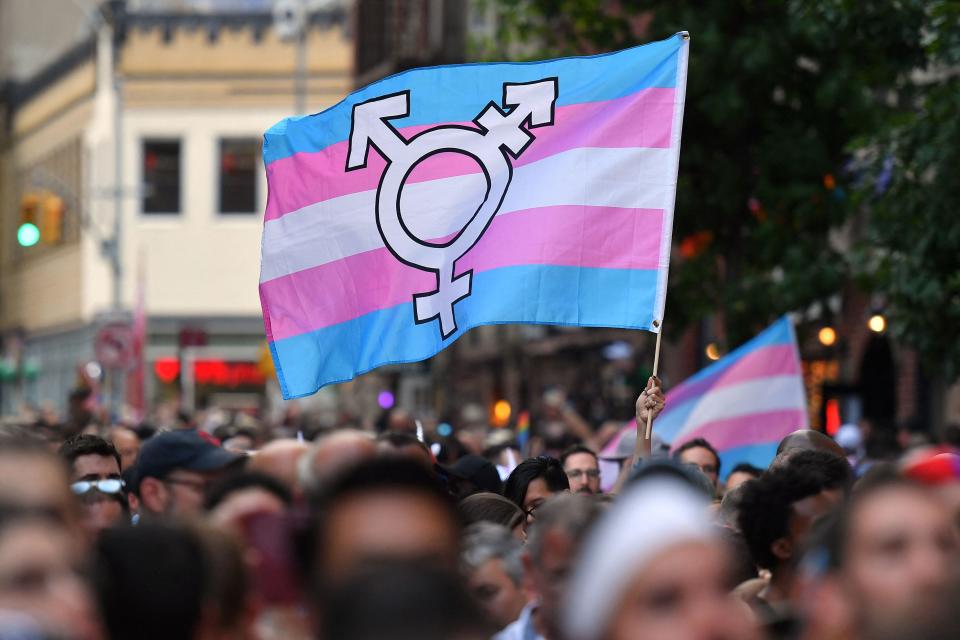
Taking a wait-and-see approach
In late January, days after Angie Noemi González, a nurse and mother of three, was found dead in a ravine, Puerto Rican Gov. Pedro Rafael Pierluisi Urrutia proclaimed a state of emergency.
It was a measure long demanded by women’s rights advocates upset by violence against women on the island – including the slaying in September of a 20-year-old woman abducted by men who pulled up in a white van as she waited outside her home to be picked up by a friend. Police waited four days to act on the report.
More recently, the body of Keishla Rodriguez, 27, who was pregnant, was found Saturday in a San Juan-area lagoon. Félix Verdejo, a former Olympic boxer, turned himself in to authorities Sunday and is charged in connection with the crime.
Transgender activists persuaded the governor to include the community in the executive order that accompanied his declaration; the order pledged new and improved programs to prevent gender-based violence and support its victims. It created a government position and committee of officials, academics and community advocates to oversee the effort.
Though the moves don't go as far as LGBTQ rights protections undertaken in California, New York and Massachusetts, Labiosa of San Juan’s Waves Ahead said they mark a bold step forward – if they pan out. He and others in the community are taking a wait-and-see approach.
“That’s the pattern here: Committees are set up, and nothing comes out of that committee," he said.”
Advocates said more needs to be done. Schools need to teach kids to respect gender diversity, they maintain, and government and law enforcement leaders need to make sure hate crimes are prosecuted accordingly.
The Human Rights Campaign is prodding the Biden administration to create a task force or advisory council to address anti-transgender violence. Hate crime laws differ from state to state, or don't exist at all, so definitions and data collection vary, “and that’s kind of the problem,” HRC’s David said. “We need to have some federal oversight.”
Rodriguez, of TransLatinx DMV, said Latina transgender women have for too long remained "a minority inside another minority."
"When people in power raise their voices, they can have an impact, and in this case, people need to raise their voices for us," she said.
As a trans woman accepted by her community, Rodriguez said she finally has an opportunity to succeed, and she's surviving.
“I’m 45 years old, and I’m still alive," Rodriguez said. "And that’s an achievement."
This article originally appeared on USA TODAY: Transgender killings: Puerto Rico's transwomen murder rate hits record

